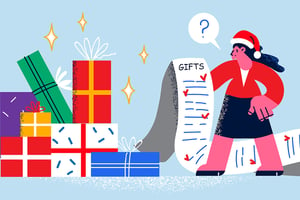It’s an interesting time for the luxury market. The age profile of buyers is shifting while the...
How to market your energy saving credentials this winter

We can be somewhat thankful that October turned out to be a mild one, with double-figure day temperatures meaning we didn’t have to reach for the thermostat quite as often (or at all in my case).
But that hasn't stopped consumers from preparing for a cold winter ahead amid an energy crisis. They’re looking for ways to limit their energy usage so that their bills remain manageable and bank balances stay healthy.
I’m one of them. And this weekend typified just how hungry consumers are for energy-saving products when I was sat in a queue with 113,000 other people on the Aldi website trying to bag an air fryer for a bargain price. Alas, I was unsuccessful…
It’s not just air fryers (which are much cheaper to use than your standard oven, by the way) that are flavour of the month – electric blankets/throws, heated airers and even slippers are being purchased like never before as people try to combat the cost-of-living crisis.
So, it’s fair to say that consumers have got their eyes and ears open for ways to keep a lid on their energy costs this winter – but how do you market your energy-saving credentials without coming across as opportunist?
Give energy-saving advice
Not all of us are well versed in how to live in an energy efficient way, and we are all always open to cost-saving tips that also have a positive impact on the environment. Previously, many of us had the luxury of being able to turn the heating up as and when we like, without too much worry over how much it’s going to cost.
But now we want to hear every small tip, such as how bleeding your radiators will improve the efficiency of your central heating by letting the trapped air out of the system... and such like.
Consumers are calling for cost-saving and energy-saving advice right now. And that’s exactly what some of the biggest names in the UK are doing.
In September, Iceland launched a series of cost-of-living workshops in partnership with energy firm Utilita to help customers make more than £600 of annual savings as part of its ‘Shop Smart, Cook Savvy’ campaign.
The campaign sets out to “help families better understand the cost of cooking, and help identify the most economical cooking methods available to them to make budgets stretch further”.
Meanwhile, Asda has launched the ‘Essential Living Hub’, an online tool for shoppers to get money-saving tips, including how to save energy, budgeting, buying and cooking smarter, and ideas for free family days out.

Provide appealing payment options
For the more product-based brands, the cost-of-living crisis potentially puts them in a precarious situation. With people having less disposable income this year, careful marketing is required to ensure survival.
Electrical retailer Currys is allowing customers to defer spending money on its products until next year, when it’s hoped that the crisis might have eased somewhat.
The retailer launched a new 12-Month Pay Delay, allowing shoppers both the time and space to pay for the essential tech they need.
Currys chief commercial officer Ed Connolly said: “Our Inflation Busters have been designed specifically to help our customers buy essential products at this tough time.”
It also launched its Price Lock promise, freezing the price of the most popular tech products to their lowest 2021 price and relaunched its Cash for Trash offering, which allows customers to recycle old, broken or unused tech in exchange for vouchers that save customers money on new tech, even if it has no value at all.
Push big-ticket items
Appealing payment terms could even turn heads to some of the big-ticket purchases that consumers have put off for years – we’re talking about things like insulation, double-glazed windows, and a modern boiler.
We all know the long-term benefit of such home improvements, but it has never felt like the right moment to make the investment. Until now perhaps. This is a prime opportunity to tie those investments to both the energy and the climate crises.
Whilst this is a worrying time for many families, it’s worth considering that lowering our carbon emissions is good for the planet, and may even force us to look to a future where we’re less dependent on fossil fuels.
It’s never easy to sell the positives of a crisis – but we have the COVID playbook to refer to at least!
Whatever route you take with your energy-crisis campaigns, make sure you’re supporting it with branded content. Branded content allows you to put some meat on the bones of your campaign, targeting your audience in publications they trust.
When designing out your energy-crisis marketing this winter, we can help with campaigns designed to deliver. Contact us today to see how we create and distribute inspiring, on-brand long form content that performs.


